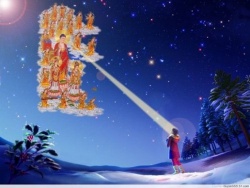Styāna
(Redirected from Gloominess)
Jump to navigation
Jump to search
Styāna (Sanskrit; Tibetan phonetic: mukpa) is a Buddhist term that is translated as "lethargy", "gloominess", etc. In the Mahayana tradition, styāna is defined as a mental factor that causes the mind to be withdrawn, unclear, and unable to focus.
Styāna is identified as:
- One of the Mental factors Twenty secondary unwholesome factors|twenty secondary unwholesome factors within the Mahayana Abhidharma teachings
Definitions
The Abhidharma-samuccaya states:
- What is gloominess' It is the way in which the mind cannot function properly and is associated with moha. Its function is to aid all basic and proximate emotions.
Mipham Rinpoche states:
- Lethargy belongs to the category of delusion. It means to be withdrawn, mentally incapable, and unable to focus on an object because of heaviness of body and mind. It forms the support for the disturbing emotions.
Alexander Berzin explains:
- Foggymindedness (rmugs-pa) is a part of naivety (Moha). It is a heavy feeling of body and mind that makes the mind unclear, unserviceable, and incapable either of giving rise to a cognitive appearance of its object or of apprehending the object correctly. When the mind actually becomes unclear, due to foggymindedness, this is mental dullness (bying-ba).
